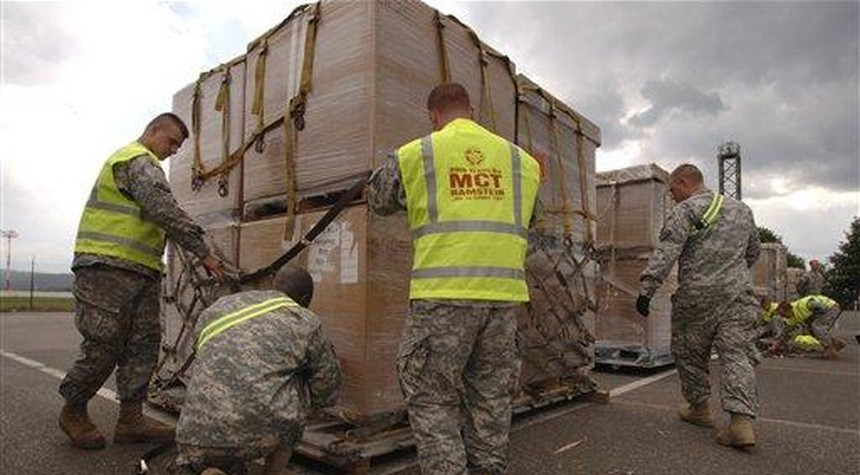The Next Ukraine Aid Conference Will Reflect a Change in Western Views on the End Game in Putin's War
The Ukraine Defense Contact Group is set to meet Friday at the US-leased airbase in Ramstein, Germany. These meetings started in April (see 40 Nations Meet at Ramstein to Coordinate Ukraine Aid and Further Integrate Ukraine Into NATO). They bring together representatives from about 40 nations to coordinate military and non-lethal aid for Ukraine. This meeting promises to be the most significant, perhaps contentious, meeting so far. Following on the announcement last week that the US would provide M2 Bradley Infantry Fighting Vehicles comes this via Politico.
The package will likely include a number of Strykers, an eight-wheeled armored fighting vehicle built by General Dynamics Land Systems, as well as ground-launched Small Diameter Bombs, which have a range of roughly 100 miles, two of the people said. POLITICO first reported last week that the Pentagon was considering sending Strykers in the upcoming tranche of aid. Reuters first reported that Boeing-made Small Diameter Bombs were under discussion.
Canada will pledge 200 Roschel Armored Personnel Carriers. Sweden will send 12 state-of-the-art Archer 155mm self-propelled howitzers.
The key issue before this meeting is what next? First, Ukraine stopped the Russian invasion. In its September-October offensive (Putin’s War, Week 28. The Sitzkrieg Goes Blitzkrieg as Ukraine’s Army Moves 50 Kilometers in Two Days), Then Ukraine pushed the Russians out of most of their gains during the invasion and used maneuver to (nearly) bloodlessly force the Russians to abandon Kherson city and the territory on the right bank of the Dnieper River (Putin’s War, Week 37. Kherson Liberated and Winter Comes). Now would be the time to negotiate an end, except Russia has unilaterally annexed four more Ukrainian oblasts. Even the “foreign policy realists” are belatedly coming to the conclusion that there are exactly three ways to end this war.
- Ukraine is forced to accede to Russia’s terms and give up its entire Black Sea coastline, and be reduced to a satrapy of Moscow;
- A truce line is established along the current line of contact, creating another “frozen conflict” and setting the stage for another Russian invasion in the future; or,
- Russia is driven out of Ukraine, possibly even Crimea, and NATO gives Ukraine security guarantees against any future Russian invasion.
Much of NATO is leaning toward option number three.
Earlier this week, the Brits announced they would transfer a single squadron, 14 tanks, of top-of-the-line Challenger 2 tanks to Ukraine. These working with the 50 Bradleys receiving training at Grafenwoehr, Germany, would make a battalion task force that, if supported by artillery and properly handled, could break the developing stalemate.
Wrapped inside the “what next” question is how much capability does NATO want Ukraine to have? Does it want Ukraine dishing out payback on Russian cities in proportion to the criminal attacks on Ukrainian population centers the Russians are carrying out? I think Ukraine’s strikes against Russian strategic bomber bases using homegrown “kamikaze” drones have put some of the BigBrainThinkers® at State and the Pentagon off their feed as they are sensing that Ukraine is unwilling to play by the losing set of rules for losers trying to lose hatched by the McNamara Defense Department during Vietnam.
But unless it allows some sort of “deep strike” capability, Russian troop concentrations, logistics, communications, and headquarters targets will remain out of reach of Ukrainian artillery. The Guided Multiple Launch Rocket System (GMLRS) rockets used by the M142 HIMARS has a range of nearly 60 miles. Ukraine has been campaigning to get the Army Tactical Missile System (ATACMS) with a range of 190 miles. The ATACMS would place every facility in Crimea in jeopardy, including the Black Sea Fleet.
In this aid package, the US sought to split the difference and authorize Ground-Launched Small Diameter Bombs. This system mates an existing rocket engine with an advanced glide-capable precision-guided 200-pound bomb. It can be launched from HIMARS and has a range of approximately 100 miles. This would place 100% of occupied Ukraine in range. The weapon could also hit deep into Crimea. It may not be what Ukraine wants, but it is sufficient to cut all supply lines from Russia to Crimea and to isolate the front lines from support.
The contentious part involves Germany. Obviously, the 14 Challenger 2 tanks are not sufficient to do what needs to be done. Unfortunately, Britain doesn’t have a lot of extra tanks around, thanks to some 40 years of neglect of the British Army. What is available in fairly large numbers across Europe is the German Rheinmetall Leopard 2 tank. The Leopard 2 is at least a generation superior to anything the Russians have in Ukraine. Poland is replacing their fleet of about 250 Leopard 2 tanks with US and Korean tanks and wants to give them to Ukraine. Germany has forbidden the transfer because it is the country of origin.
It was hoped that the UK giving up Challenger 2 tanks would overcome Germany’s original objection, which was they refused to be the first country to send Ukraine top-of-the-line tanks, and they wouldn’t do it without consensus. Now they have both things, and Germany has added a third criterion, the US must send the M1 Abrams first. There are a lot of reasons not to send the Abrams, but that may be what it takes to free up some of the 2,000+ Leopard 2 tanks in depots across Europe. There is a lot of speculation that German Chancellor Olaf Scholtz is dragging his feet, so Germany will be better positioned to cut business deals with Russia when that becomes possible.
Regardless of what Germany does, this meeting of the Contact Group took a huge first step towards giving Ukraine the tools it needs to bring the war to a close on favorable terms. If they use these weapons competently, bigger and better things will come their way in the future.





Post a Comment